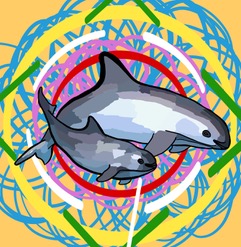 (c) Saint.Mills 2019 (c) Saint.Mills 2019
History
Little is known of the vaquita early history but they have lived in the Upper Gulf of California of Baja, Mexico, for thousands of years. Its population was never large - somewhere in the 5,000 range, but now it is reduced to 12-15. How did this happen? How did this small porpoise become the most endangered marine mammal in the world? They are found nowhere else in the world except for the Upper Gulf of California.
The species is being driven to extinction by illegal gillnet fishing. The vaquita are caught in nets set for totoaba, an endangered fish. Totoaba swim bladders are thought to hold medicinal value in Asia. The bladders are referred to as the "cocaine of the sea," because they sell for thousands of dollars. Mexico instituted a temporary ban on gillnet fishing in 2015 and agreed to compensate fishermen in the vaquita region for their lost catch, mainly shrimp. However, shrimp is one of their main products and the United States, their top buyer.
Now fishermen want their gillnets back and poachers are undeterred in their quest for totoaba.
The illegal poaching leaves dead vaquita in their wake and the population continues to decline. It has become contentious in some areas where the most fishermen reside. Sea Shepard has been in the area trying to disrupt the illegal fishing methods to help the vaquita.
Save The Whales and many nonprofit organizations, scientists, individuals, and videographers have been involved with trying to help save the vaquita over the past decade. Despite all of these efforts, the population has continued to decline largely due to the unrelenting and illegal fishery for the totoaba bladders.
Perhaps our lesson as a society is that species are facing extinction and disappearing as the demand for natural resources increases.
"1 Million Postcards"
There are less than 12-15 vaquita porpoise remaining on earth. February 2019 was the last month to achieve the nationwide goal of "1 Million Postcards" to help save the world's most endangered marine mammal. Save The Whales collected several thousand postcards nationwide from schools, churches, libraries and environmental groups. In Monterey and Santa Cruz Counties, schools actively participated in this effort.
Save The Whales brought Hope, their life-size model of a vaquita calf, to schools in the California Central Coast area. Educators gave a 10-minute presentation followed by the signing of the postcards.
The "1 Million Postcards'' urged the newly seated Mexican President Andrés Manuel López Obrador to protect the few remaining vaquita only found in one place in the world, and it is in his country.
Student artwork (see above) was collected and delivered in person, with the postcards, to the Mexican Embassy at the end of February.
In Greenfield, California
On February 26, 2019, the City of Greenfield, California signed a proclamation to support strong conservation efforts for the vaquita porpoise. They appreciate the efforts of Save The Whales in their community. The moving artwork and messages from Monterey County students (many written
in Spanish) have really touched a number of residents. Greenfield participated in the "1 Million Post Cards" drive and is committed to continue efforts to make a difference for vaquita and other endangered species.
A big thank you to Dan Albro of Save The Whales, as his mission to save vaquita inspired the residents of Greenfield. He has spread the message to students all over Monterey County. In addition, Tom Kieckhefer and Amanda Good, of our education team, helped to get many cards signed.
Save The Whales believes reaching inland schools and communities is critical to making the connection to protect endangered species and the environment.
Limited Edition T-Shirt To Bring Awareness
Save The Whales just launched a LIMITED EDITION (now through May 15) with beautiful vaquita art on
T-shirts and sweatshirts for kids and adults! All items come in a variety of colors. The artwork was done by college student Saint.Mills (design at the top of Newsletter) after he learned about the plight of the vaquita. The goal is to bring awareness to the most endangered marine mammal in the world. Great gifts for friends and family! Don't miss this opportunity.
Place your order now at:
___________________________________________________________________________________
Save The Whales Saves A Whale on Easter
We received an urgent report on Easter Sunday (or rather Maris Sidenstecker 2 did) from a member of the public, Mr. Fraser. He had seen a whale entangled and dragging a float and fishing line off of Laguna Beach (Orange County, Southern California). Maris called the California Whale DIsentanglement Team (W.E.T.) for CA. The hotline number in CA is (877) SOS-WHALE (767-9425). This number and nationwide and international numbers can be found on our website:
https://savethewhales.org/report-stranded whales/. The dispatcher at W.E.T. said another report had come in on the whale and that the National Oceanic and Atmospheric Administration (NOAA) boat had been dispatched. The system does work. Kudos to Mr. Fraser for contacting Save The Whales and the W.E.T. team, a group of highly trained marine mammal professionals.
Sincerely,
Maris Sidenstecker I
President, Save The Whales
501(c)(3) Nonprofit Organization
|